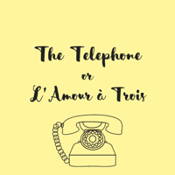
Overview
Synopsis
All Ben wants to do is propose to his girlfriend, Lucy, before he leaves on a train trip. When he goes to her apartment and tries to propose, however, he finds himself interrupted by a constant stream of phone calls. As Lucy gossips with her various friends and acquaintances, Ben becomes more and more impatient, and at long last leaves the apartment and calls Lucy himself from a pay phone. Finally, he is able to propose, and she accepts. Before he leaves for his train, she sweetly reminds him to remember her telephone number. As relevant in today’s cell-phone-obsessed society as it was back in the day of rotary phones when it was premiered, The Telephone is a delightfully funny one-act opera that is approachable and enjoyable for opera newcomers and aficionados alike.
Show Information
Context
The Telephone was written for the Ballet Society in New York City, and premiered in February 1947 at the Heckscher Theater. Composer Gian Carlo Menotti crafted both the libretto and the music to be an opener for his short opera The Medium , with which it is frequently double-billed. The Telephone itself runs just about 25 minutes. The pair of shows has appeared together on Broadway later the same year, and the Metropolitan Opera performed The Telephone as part of a concert in 1965.
Due
to read the context for L’Amour à Trois and to unlock other amazing theatre resources!Plot
The curtain opens on Lucy’s apartment. Her boyfriend Ben has just given her a gift box, which she opens to reveal an abstract sculpture. “Oh! Just what I wanted!” Ben moves on to a more pressing matter--he has a very important question to ask her. He begins to launch into a speech about how much he loves her, but before he can finish, Lucy’s telephone rings, and she excuses herself to take the call. It is her friend, Margaret, with whom she has a long, gossipy, and laughter-filled conversation
to read the plot for L’Amour à Trois and to unlock other amazing theatre resources!Songs
A song with an asterisk (*) before the title indicates a dance number; a character listed in a song with an asterisk (*) by the character's name indicates that the character exclusively serves as a dancer in this song, which is sung by other characters.
Monologues
Scenes
Key Terms
Sorry! We do not currently have terms for this guide.
Videos
Quizzes
Sorry! We do not currently have quizzes for this guide.
Themes, Symbols & Motifs
Sorry! We do not currently have learning modules for this guide.
Quote Analysis
Sorry! We do not currently have learning modules for this guide.
